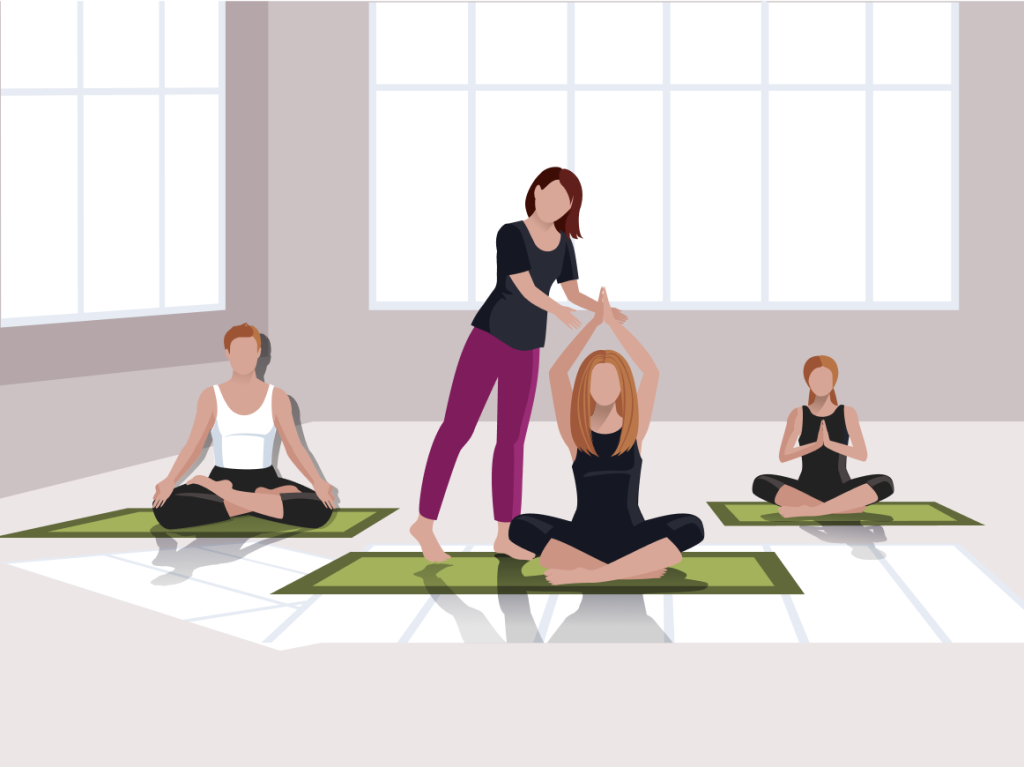In today’s fast-paced world, anxiety and depression have become common mental health challenges affecting millions of people globally. While conventional treatments like medication and therapy are effective, there is a growing interest in complementary practices such as yoga. Yoga, an ancient practice originating in India, has been shown to have profound benefits for mental health. This blog will delve into how yoga can help manage anxiety and depression, explore the science behind its impact on the body and mind, and provide practical tips for incorporating yoga into your mental health routine.
The Role of Yoga in Managing Mental Health
Yoga is not just a physical exercise; it is a holistic practice that integrates the mind, body, and spirit. The practice of yoga involves various components such as postures (asanas), breathing techniques (pranayama), meditation, and ethical guidelines. Each of these elements plays a crucial role in promoting mental well-being.
1. Physical Postures (Asanas)
The physical postures in yoga help release tension stored in the body. Many people with anxiety and depression experience physical symptoms such as muscle tightness, fatigue, and headaches. Practicing asanas can help alleviate these symptoms by promoting relaxation and improving physical health.
2. Breathing Techniques (Pranayama)
Breathing exercises are a core component of yoga. Pranayama techniques, such as deep breathing, alternate nostril breathing, and rhythmic breathing, help regulate the autonomic nervous system. This regulation can reduce the stress response, lower heart rate, and promote a sense of calm and well-being.

3. Meditation and Mindfulness
Meditation and mindfulness practices in yoga help cultivate a focused and present mind. These practices can reduce rumination, a common issue in anxiety and depression, and enhance emotional regulation. Mindfulness teaches individuals to observe their thoughts and feelings without judgment, fostering a healthier relationship with their inner experiences.
4. Ethical Guidelines (Yamas and Niyamas)
The ethical guidelines in yoga, known as the Yamas and Niyamas, provide a moral framework for living a balanced and fulfilling life. These principles encourage positive behaviors, self-discipline, and self-reflection, which can improve mental health and resilience.
The Science Behind Yoga: Understanding Its Impact on the Body and Mind
The benefits of yoga for mental health are supported by a growing body of scientific research. Let’s explore the physiological and psychological mechanisms through which yoga exerts its effects.
Physiological Mechanisms
- Reduction of Cortisol Levels: Cortisol is a stress hormone that is often elevated in individuals with anxiety and depression. Studies have shown that regular yoga practice can reduce cortisol levels, thereby reducing stress and promoting relaxation.
- Activation of the Parasympathetic Nervous System: Yoga activates the parasympathetic nervous system, also known as the “rest and digest” system. This activation counteracts the “fight or flight” response, leading to decreased heart rate, lower blood pressure, and improved digestion and sleep.
- Increase in GABA Levels: Gamma-Aminobutyric Acid (GABA) is a neurotransmitter that inhibits neural activity, leading to a calming effect on the nervous system. Research indicates that yoga can increase GABA levels in the brain, which can help reduce anxiety and improve mood.
- Improved Heart Rate Variability (HRV): HRV is a measure of the variation in time between heartbeats, and higher HRV is associated with better stress resilience and emotional regulation. Yoga practices, especially those involving breath control and meditation, have been shown to improve HRV.
Psychological Mechanisms
- Enhanced Emotional Regulation: Yoga helps individuals develop greater awareness and control over their emotions. Through mindfulness and meditation, practitioners learn to observe their emotions without getting overwhelmed, which can reduce the intensity and frequency of anxiety and depressive episodes.
- Improved Self-Esteem and Self-Compassion: The practice of yoga encourages self-acceptance and compassion. This shift in perspective can help individuals with anxiety and depression develop a more positive self-image and reduce self-criticism.
- Reduction in Rumination: Rumination, or repetitive negative thinking, is a common feature of anxiety and depression. Yoga, through mindfulness and focused attention, helps break the cycle of rumination by bringing the mind into the present moment.
- Social Connection and Support: Participating in yoga classes can provide a sense of community and social support. This connection can be particularly beneficial for individuals with mental health issues, who may feel isolated or disconnected.
Practical Tips for Incorporating Yoga into Your Mental Health Routine
- Start with Simple Practices: If you are new to yoga, begin with simple practices such as gentle stretching, deep breathing, and short meditation sessions. Gradually increase the intensity and duration of your practice as you become more comfortable.
- Find a Qualified Instructor: Working with a qualified yoga instructor can ensure that you are practicing safely and effectively. Look for instructors who have experience working with individuals with mental health issues.
- Create a Consistent Routine: Consistency is key to reaping the benefits of yoga. Aim to practice yoga regularly, even if it’s just for a few minutes each day. Establishing a routine can help integrate yoga into your daily life.
- Combine Yoga with Other Treatments: Yoga can be a powerful complement to other mental health treatments such as therapy and medication. Discuss with your healthcare provider how yoga can fit into your overall treatment plan.
- Listen to Your Body and Mind: Pay attention to how your body and mind respond to yoga. If certain practices or postures cause discomfort or exacerbate symptoms, modify or avoid them. Yoga should be a supportive and nurturing practice.
Conclusion
Yoga offers a holistic approach to managing anxiety and depression by addressing the physical, emotional, and spiritual aspects of well-being. Through its various practices, yoga can reduce stress, improve emotional regulation, and foster a sense of connection and support. The scientific evidence supporting the benefits of yoga for mental health is growing, highlighting its potential as a valuable complementary practice.
Incorporating yoga into your mental health routine can be a transformative experience. Whether you are seeking to alleviate symptoms of anxiety and depression or enhance your overall well-being, yoga provides a comprehensive and accessible approach. Begin your yoga journey today and discover the profound impact it can have on your mental health and quality of life.
Download My Yogi App and Begin your Yoga Journey Now
For more information and personalized guidance on integrating yoga into your mental health routine, Download My Yogi App and explore the resources and programs designed to support your journey to well-being.





